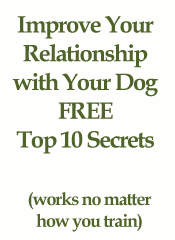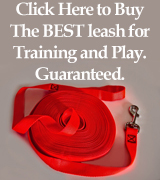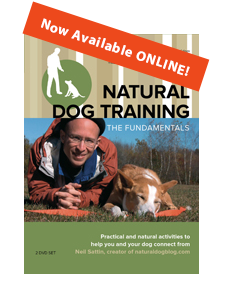It happens to almost everyone. You taught your dog to come when you called at an early age using the standard method you'll find in any book (or on any blog): calling your dog's name, then, when your dog comes to you, giving your dog a treat. Generally this method yields good results, especially when your dog is a puppy. However, at some point many, if not most dogs, will stop coming when called. Sometimes, not only do they NOT come, but they run in the opposite direction, in even-more-energized pursuit of whatever has their interest. In this article we're going to discuss why this happens and what you can do to "rehab the recall". When the time "comes", you want them to head towards you with all of the energy and drive they can muster.
So...what happened? Why did your dog suddenly get all willful (seemingly)? Is it adolescence? Mid-life crisis? I mean, they KNOW what they're supposed to be doing, right?
Well, yes and no. Let's talk for a minute about what your dog actually learned when you first trained them to come. We think that by calling their name and giving them a treat when they come to us that we're actually teaching them to come - but in reality we're teaching our dogs something slightly different. What your dog learned was that at the sound of their name (and, perhaps, the word "come"), they should go to the most INTERESTING thing in their presence. At a young age, before a dog's perception branches out to encompass more of the surrounding environment, the most interesting thing in their world is YOU. Especially when you have tasty treats. What they are learning isn't the mental concept, either - it's the FEELING of pursuing whatever interests them with full force. For the time being, that feeling is associated with you and your tasty treats.
Eventually, however, the problem arises - because after receiving treat upon treat, your dog's interaction with you gets - well...less interesting! So let's say you're walking through a local park, and because you feel like taking your chances with the dog catcher your dog is offleash. Sparky is 20 feet away from you, when suddenly Sparky sees a squirrel. What do you do? You call "Sparky, come!" And what does Sparky do? He goes with the FEELING - in pursuit of the most interesting thing in his environment, which is that squirrel, not you.
Another way of saying "the most interesting thing in your dog's environment" is to say that - no matter what - our dogs are attracted to whatever in their environment has the highest value as a PREY object. When our dogs are young, all it takes is a treat to make you prey-like enough in their eyes. Soon however it begins to register with our dogs that we are also very predator-like (potentially exacerbated by training influenced by the need to be "the alpha") - and our dogs actually develop resistance to us during high energy moments. It's possible that the first moment your dog "chases the squirrel" instead of coming to you when you call is when the amount of your "predator-ness" has finally exceeded your "prey-ness".
In order to make yourself back into the most interesting thing in your dog's universe, you need to become the highest value prey object in your dog's world. That means that no matter when your dog feels stress (or is in a high energy situation), your dog will come to you to resolve the situation. If your dog doesn't come when you call, that simply means that you're not as attractive to your dog as you need to be.
Now there can actually be several steps to getting your dog to come when called if they are in a full sprint after another prey object (like that poor squirrel). At the point where they're already engaged you have a lot to overcome in order to get yourself inserted into that circuit - so that they'll even hear "Sparky, come!", much less respond. We'll be covering some of those things (like getting your dog to lay down at a distance when they're chasing a toy) in later articles. In the meantime, there are several things you CAN do to make yourself more attractive:
- Become familiar with the concept of being the moose in your dog's life - not the alpha.
- Play Tug of War with your dog and let your dog win.
- Play FetchTug with your dog.
- Play hide and seek with your dog.
- Most importantly, learn to "push" with your dog, which allows your dog to direct 100% of their stored up stress back at you.
- Then spend time redirecting the energy they experience from interacting with the world towards interacting with you in that very moment.
Follow these steps, and your dog will be able to put their attention back where it belongs - on you. It all boils down to the fundamentals of Natural Dog Training - and once your foundation is solid you'll have no trouble improvising.





Neil, I love the clarity of this statement:
What they are learning isn’t the mental concept, either - it’s the FEELING of pursuing whatever interests them with full force.